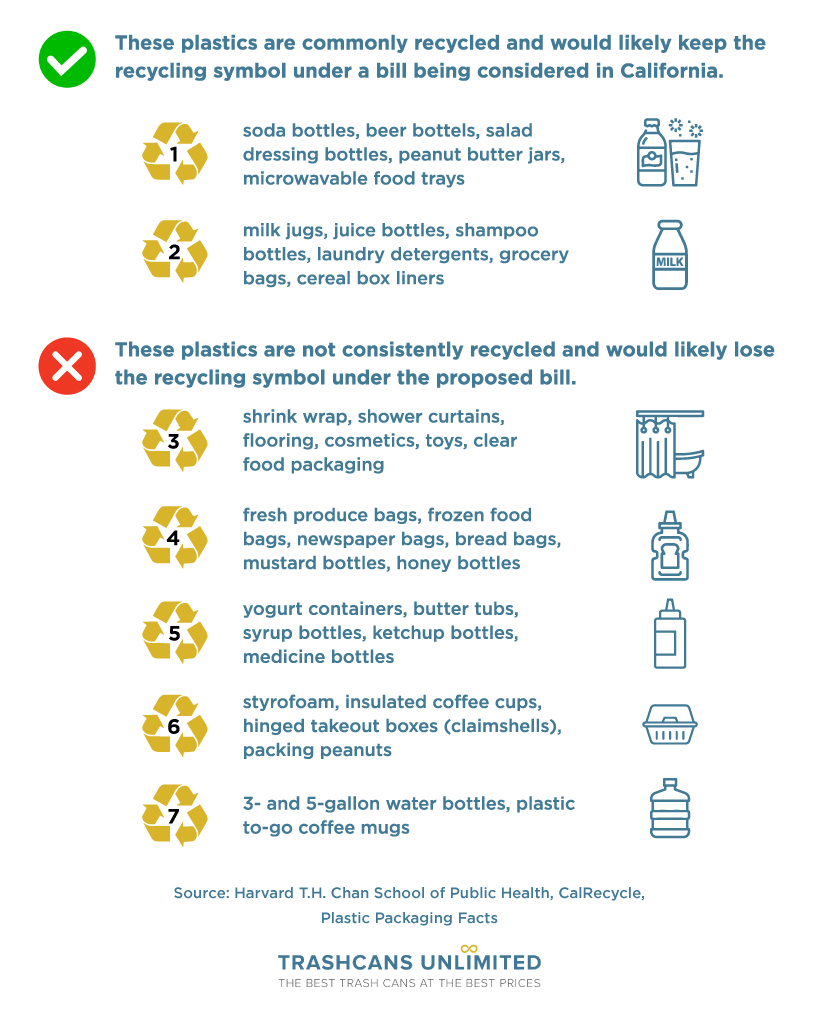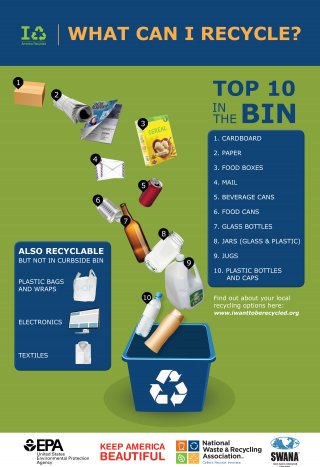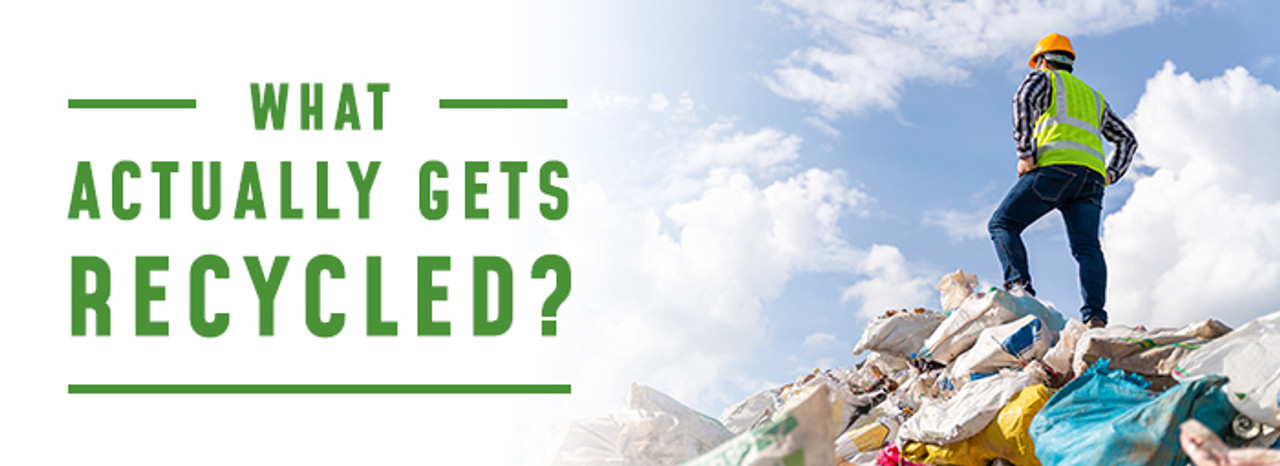For many Americans, protecting the environment starts with the recycling symbol and ends with the recycling bin. The simple act of tossing something into a recycling container makes some of us feel like we've done our part of being responsible caretakers of Mother Earth.
However, recycling is complicated. It's a system controlled by local regulations, market demands, and price determinations. Its success heavily relies on how responsible everyone in the chain is, from the product designer to the trash-thrower and all the way to the waste collector and recycler.
Besides that, America's recycling system is currently facing enormous challenges:
- Not all consumers understand recyclable materials, how materials can be recycled, and where to reprocess them. This confusion often makes someone throw trash in the recycle bin and place recyclables in the trash can.
- Ever-changing international policies have limited exporting of recycled materials. For example, China stopped recycling U.S. trash when it enacted new policies. The domestic market for recycled products needs to be strengthened in the U.S.
With the complicated nature of the recycling system and the challenges municipalities are facing on the matter, you might be wondering:
Do recyclables actually get recycled?
Quick answer: Yes. But the amount that gets reprocessed might be smaller than you expect. Sadly, not every piece of recycling you throw into the bin gets recycled. The reasons for this may include local regulations, insufficient return on investment for recyclers, and improper handling.

Below, we dive deeper into the common recyclables to reveal what can and can't be recycled (what you think is recyclable might not be). You will also discover the percentage of different types of recyclables that get reprocessed. But first, here's a closer look into the recycling process.
How Does Recycling Works?
The recycling process differs by locality and commodity, but three main steps are constant: collection, processing, and remanufacturing.
Step 1: Collection
Methods of collecting recyclables include drop-off centers, curbside collection, and refund programs. Government entities or private haulers can gather the materials.
Step 2: Processing
After collection, the materials go to a recovery center to be sorted, cleaned, and processed into products that can be used to create other valuable commodities. Like other raw materials, prices for recyclables rise and fall depending on supply and demand in the U.S. and the world.
Step 3: Manufacturing
More and more manufacturers are using recycled content to create products. Common household commodities with recycled materials include:
- Steel cans
- Plastic detergent bottles
- Paper towels and newspapers
- Glass soft drink containers, plastic, and aluminum
Recycled materials are also used innovatively, such as recovered plastic in carpeting and park benches and recovered glass in asphalt to pave roads.
Step 4: Buying New Products Made from Recycled Materials
You (consumers) close the recycling loop by purchasing new items made from recycled materials. Here are the products you should look for when shopping:
- Commodities that can be easily recycled
- Products that are comprised of recycled content
So, how will you know a new product is made from recycled material? Below are the commonly used terms:
- Recyclable product: This label means the product can be collected, processed, and manufactured into a new commodity after using it. Remember, a product may be recyclable but doesn't get reprocessed in your area. Confirm with your local recycling program before you purchase.
- Recycled-content product: A product with this label was made from recycled materials collected from recovered waste or a recycling program. Sometimes, the label includes how much of the content was from recycled materials.
- Post-consumer content: Products with this label are similar to recycled-content items but made of recyclables collected from consumers through a recycling program.
Be mindful of your purchases. Avoid over-buying commodities like single-use plastics with a short life cycle and simply end up in the trash.
What Are the Common Recyclables? (And What Amount Gets Recycled)

Paper, glass, metal, and plastic are the most common recyclables. But as you are about to discover, these materials recycle differently. The actual recycling percentage of each is quite different as well. Let's look at these recyclables individually to learn more.
Plastic
According to the EPA, the United States generates 35.7 million tons of plastic waste annually. But only 3 million tons are recycled, which is less than ten percent (8.7%). In 2018, landfills received 27 million tons (over 75%) of plastic.
And even recycled plastic will reach a point where it isn't fit to be reprocessed. When plastic is recycled, it loses its quality over time. The same plastic can only be reprocessed about two to three times before its quality degrades beyond any value. The more a piece of plastic is reprocessed, the more it becomes unfit for recycling.
Frequently we toss plastic waste into the recycling bin with the full faith that it will be recycled because the label says so. However, the stats above reveal that's not always the case.
You can recycle plastic bottles, containers, bags, wraps, and cups, but you CAN'T recycle the following:
- Dirty plastic, like that with food debris
- Plastic utensils
- Compostable or bio-based plastic
Metal
Metal is more recyclable than plastic. EPA statistics show that the United States generates 19.2 million tons of steel and iron yearly. The recycling rate of steel and iron from durable goods was nearly 27.8% (4.7 million tons) in 2018. The recycling rate for metals that don't contain iron was 68% (2.5 million tons).
While metals are infinitely recyclable, recycling them is often inefficient because of limits imposed by recycling technologies and product design, among other constraints.
What metal you can or can't recycle depends on your area. Check to find out what you can recycle in your locality.
Paper
EPA data says that paper is the most recyclable material of all waste. In 2018, the recycling rate of paper and paperboard was 68.2%, which was the highest compared to any other material in municipal solid waste (MSW). Out of 67.4 million tons of paper and paperboard waste, approximately 46 million tons were recycled that year.
This recovered paper can be used to make new paper products to save trees and other natural resources. You can recycle dozens of paper-based products — newspapers, pizza boxes, mail, magazines, books, cardboard, shredded paper, and more. However, paper gift wrap with a shiny or laminated coating is often not recyclable.
Glass
Glass is part of municipal solid waste, primarily in the form of containers such as beer and soft drink bottles. Statistics suggest that the country generates 12.3 million tons of glass waste and recycles 3.1 million tons (31.3% recycling rate).
Glass recycling is infinite — you can recycle it over and over again without it losing quality. Plus, making new glass from recycled material is cheaper than using raw materials.
That said, you can recycle different glass types and colors together. However, you can't recycle broken glass. Additionally, glass bottles should be recycled separately from metal bottle caps.
TrashCans Unlimited for Your Recycling and Waste Management
For the environment, recycling reduces the amount of waste going to landfills and conserves natural resources like timber.
As an additional benefit, recycling enables us to tap into domestic sources of materials and save energy. It also creates jobs in the recycling and manufacturing industries within the country.
So not only does recycling come with environmental advantages, but it also enhances economic and community benefits. For affordable deals on plastic recycling bins, office recycling containers, and decorative recycling bins, get in touch with Trashcans Unlimited.

